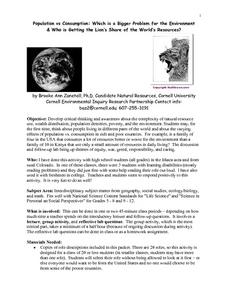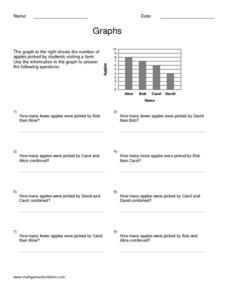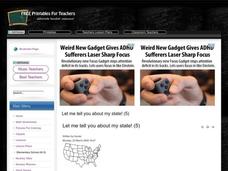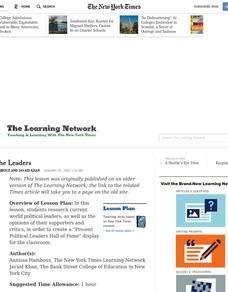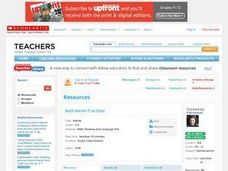Curated OER
Getting the Message: What Did You Say?
Learners listen to and compare the first sentence of the Gettysburg Address spoken in different languages. They also compare frequency readings for each and discuss how the brain interprets spoken words.
Curated OER
Island Survival
Students participate in a simulation of life on a deserted island. They work with their group to develop an island survival plan and summarize it in a journal. Students use a worksheet and challenge cards to earn points. They will be...
Curated OER
Some People Just Don't Get It
In this daily mind builders worksheet, students use inferential reasoning and deduction. Students read a short passage and respond to 6 short answer questions stating their own opinion and providing evidence to support their conclusion.
Curated OER
Literary Wizardry
Students discuss what they already know about the Harry Potter series. After reading an article, they examine a critic's reaction to the latest book in the series. As a class, they brainstorm what parts of their school day could use...
Curated OER
Population Vs Consumption: Which is a Bigger Problem for the Environment & Who is Getting the Lion's Share of the World's Resources?
Students develop critical thinking and awareness about the complexity of natural resource use, wealth distribution, population densities, poverty, and the environment. They think about people living in different parts of the world and...
Curated OER
Graphs
In this graphing worksheet, students read information and study diagrams about graphing. Students complete 3 graphing activities.
Curated OER
Let Me Tell You About My State
Fifth graders research one of the 50 U.S. States that they were unfamiliar with. For this U.S. Geography lesson, 5th graders utilize encyclopedias as well as the Internet to research a chosen U.S. State in order to write a report....
Curated OER
If I Could Talk Like the Animals. . .
Students read and discuss a film review of the animated movie Antz and then write a monologue from the perspective of a non-human organism.
Curated OER
Stephen Crane's "The Open Boat"
Students critically examine the relationship of man and nature in Stephen Crane's "The Open Boat." students examine the third person point of view and conduct in-depth character analysis.
Curated OER
Follow the Leaders
Students research current world political leaders, as well as the opinions of their supporters and critics, in order to create a "Present Political Leaders Hall of Fame" display for the classroom.
Curated OER
Global Resources: What Will You Do with Your Power?
Young scholars examine the human impact on natural resources. They read and discuss an article, evaluate nations regarding their environmental problem-solving, develop a presidential speech on the environment, and conduct a natural...
Curated OER
Salvaged Pages: Writing as a Response to Literature
Students discuss the topic of the Holocaust. Before reading and discussing Elie Wiesel's "Night", they complete an activity giving them a different perspective on the event. They read diaries and journal entries of children and write a...
Curated OER
MONSTERS AND MYTHS: SCRIPTS /SCULPTS
Seventh graders are introduced to myths formed by many cultures as a unique genre of literature. They use critical thinking skills to compare and contrast mythic tales, compare versions of the same story, and respond to literature in...
Curated OER
Creative Problem Solving
Learners respond to a situation presented about the wetlands. In this wetlands lesson plan, students understand the various opinions over the use of areas in the wetlands. Learners complete a worksheet using critical thinking questions...
National Endowment for the Humanities
The Impact of a Poem's Line Breaks: Enjambment and Gwendolyn Brooks' "We Real Cool"
High schoolers analyze the Gwendolyn Brooks use of enjambment in her poem "We Real Cool." For this poetry analysis activity, students define common poetic devices and the examples of enjambment in the poem. High schoolers discuss the...
Curated OER
A World of Myths
Students read and write myths. In this world mythology lesson, students read and analyze myths from various cultures and then recognize their attributes as they write their own myths to explain natural phenomena.
Curated OER
Elements of Myth
Students read and act out myths. In this world mythology lesson, students read and analyze myths from various cultures and then recognize their attributes as they prepare presentations of myths that explain natural phenomena.
Curated OER
Globalization 101
Students explore the challenges created by cultural globalization. In this history activity, students read several hand-outs centered on the topic, then participate in a class discussion and fill in a worksheet.
Curated OER
Consider the Source
Learners explain how to critically compare news reporting from around the world, focusing on coverage of the Taliban regime. They compare and contrast television and print media reporting on the issue.
Curated OER
In the Pilot's Seat
Students examine a review of several of the new television series launching in the Fall 1999 season and interpret how a critic discusses the notion of 'repurposing' old shows. They work in small groups to create basic character sketches...
Curated OER
Author of the Month
Fourth graders research authors on the Web each month in based on the themes in their reading book. They create an author booklet which includes a picture and biographical information.
Curated OER
Slaves, the Labor Force, and the Economy
Students examine critical role that slaves, freemen, and plebeians played in the Roman Empire. They complete creative writing that addresses how the Roman class system and the use of slavery contributed to the downfall of the Roman Empire.
Curated OER
It's Mine Lesson Plan
Students read a book called It's Mine! In this instructional activity about three frogs and sharing, students explore how what they do affects everything around them. Through a series of seven different activities, students interpret the...
Curated OER
Math Maven Fractions
Students solve fraction mysteries. In this fractions lesson, students read Math Maven's Mysteries and use problem-solving and critical thinking skills to solve the mysteries.






